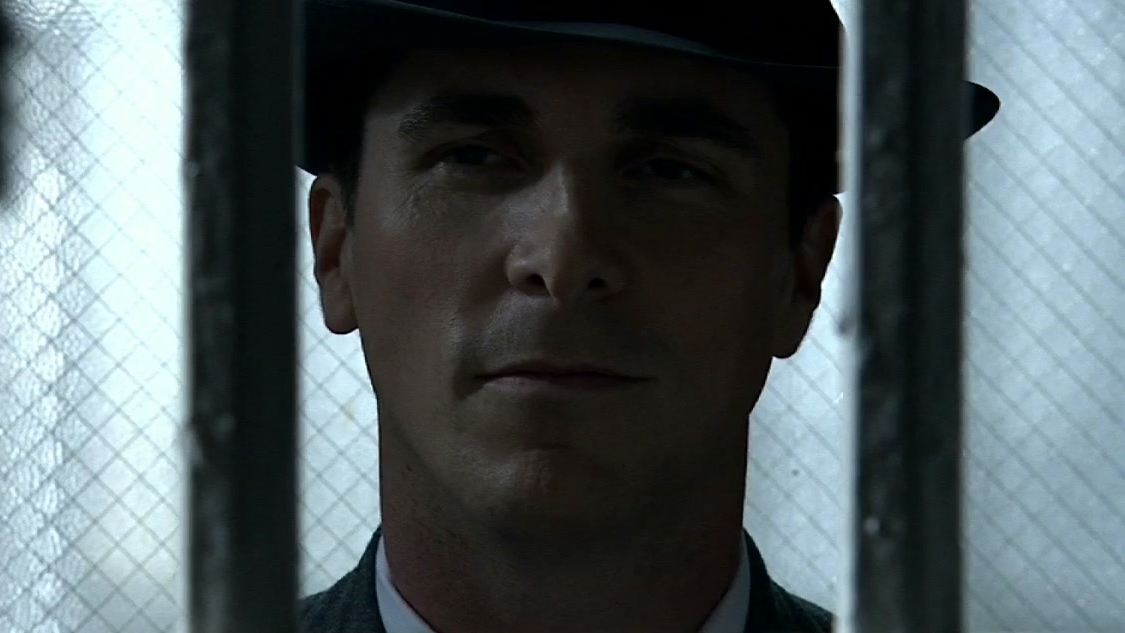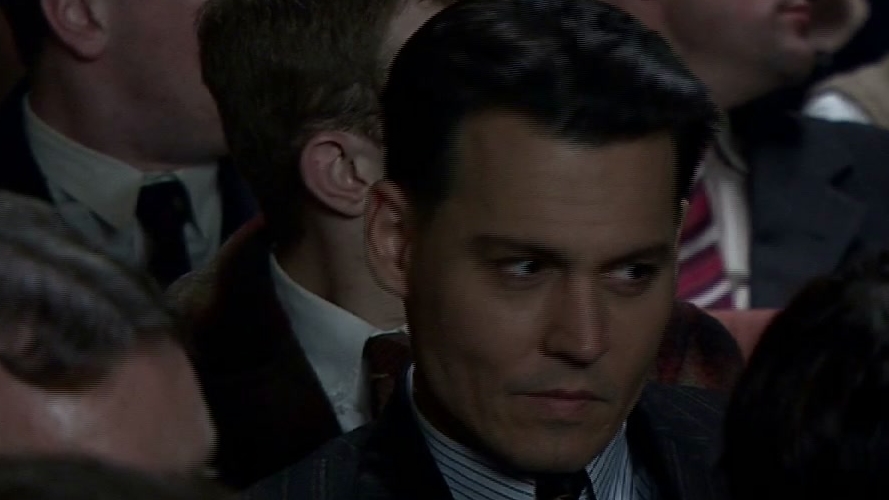Public Enemies
- 2009
- Tous publics
- 2h 20min
Les années trente, la police fédérale essaie de descendre des gangsters américains John Dillinger, Baby Face Nelson et Pretty Boy Floyd pendant une vague de criminalité en plein essor.Les années trente, la police fédérale essaie de descendre des gangsters américains John Dillinger, Baby Face Nelson et Pretty Boy Floyd pendant une vague de criminalité en plein essor.Les années trente, la police fédérale essaie de descendre des gangsters américains John Dillinger, Baby Face Nelson et Pretty Boy Floyd pendant une vague de criminalité en plein essor.
- Réalisation
- Scénario
- Casting principal
- Récompenses
- 1 victoire et 14 nominations au total
Avis à la une
The first surprise is how the movie is shot. As one of the most vocal followers of digital video, Mann seems to exploit its handicaps instead of trying to convince us it can look as good as film. Throughout the movie we're treated to 3D video feel, artificial grain and close-ups which show up every pore on the actors skins. It's like someone sent a documentary crew back in time. However, this incongruous approach also made me experience the 1930s in a way I'd never done before, as a reality instead of a postcard. Almost all movie depictions of the "public enemies" era (even the gritty ones, like Bonnie and Clyde) are stylish and sophisticated. Instead, Mann's compulsive attention to prop and costume detail combined with the hand-held camera-work are immediately urging and attention-grabbing.
Mann, as a filmmaker, always seemed to me more interested in technique than depth or story. This is arguably the same film he has made twice before (I'm talking about Thief and Heat), only this time history-based. As I read on about Dillinger and Melvin Purvis after watching the film, I realized the movie's script is very unusual in that it almost seems to strip the juicy bits out of the story. Where is the scene with the people soaking their handkerchiefs on Dillinger's blood, or the '30s era depression portrait? Like you guys were saying, Little Bohemia was in fact an embarrassment to the FBI in which civilians got shot and the criminal walked away unharmed. Except for a weird scene in which Dillinger walks into the Chicago police station and wanders around, there's a very down-to-earth approach to the character, taking away his more mythical elements and leaving us with a career robber who, like James Caan's character in Thief, seems to abstractly decide to fall in love to make up for lost time.
The movie focuses obsessively on this relationship, instead of the more obvious paths it could have taken. Hoover's incompetence and his closet homosexuality are brief side notes. So is Melvin Purvis. The movie strips him of a personality, showing only the professional side of the policeman. This is so evident that when the title card near the end informs us that he later shot himself, I had to laugh it was so random. I seem to be speaking against all of this, but in fact what I'm doing is pointing out how unusual all of these directorial choices are. In fact, I celebrate them. Public Enemies is a movie that might seem frustrating to many, but to me, it was a refreshing, exciting journey into a world too often depicted and too easily neutralized. It's a great thing to see a copmen-and-robbers film without feeling like I've seen it all before. And make no mistake, the film's action scenes are intense.
I'd like to finish by pointing out that the movie has a hell of a cast. Johnny Depp is a revelation in a time when it looked like his awesomeness was exhausting itself. Christian Bale is not given much to do as Purvis, but he's competent, mostly the Bale serious face we see too much of all the time. Billy Crudup's Hoover is great, he deserves his own flick. Marion Cotillard is a great foil to Depp. There are a lot of very famous faces on the film (in fact, maybe too many), and some of them are only in for very brief seconds - Lily Tomlin, Giovanni Ribisi and Leelee Sobieski enter and leave the screen and they're all very good, but none have any big scenes. This might be the artsiest blockbuster I've ever seen. Which, in my mind, is a compliment.
The story is about a gangster bank robber, John Dillinger(Johnny Depp), back in the '30's, who pulled off a couple of daring heists and prison breaks. He was generally considered a hero among the public, as this was during the years of the great depression and Dillinger was seen as someone who steals from the rich man. A fledging FBI, led by the peerless J. Edgar Hoover, decide to hunt him down so that they can grow the organization, and name him Public Enemy Number 1. Melvin Purvis(Christian Bale) is assigned the task of leading this group of agents.
Johnny Depp is as usual great, but you get a feeling he would have been even better if the script had given enough scope to explore the character of Dillinger. The same goes with his love interest, played by Marillon Cotillard. Again, a wonderful actress, but at times the love story seemed forced into the story. Despite this, they have great chemistry.
Which brings me to Christian Bale. This is an actor who has so much more to offer than the half baked roles he has been getting this year. You get a feeling this year that he is being offered big movies which don't give him a character he can bite his teeth into. First there was Terminator Salvation, and now this. In both, his character never really seemed into the movie as compared to the others. I'm waiting to see a movie again where he will assert himself.
Despite the flaws, this is still a good movie from Mann. Just don't go in expecting it to out do his best.
And that's the case here. Superficially, the movie looks good and the characters go through the motions with aplomb, but you never really care about what happens to them. Bale's protagonist is totally unmemorable, leaving Depp to hold the fort as the anti-hero of the piece, but whenever the film moves away from a complex action set-piece it falters. Depp's romance with Marion Cotillard is particularly gruelling and heel-dragging.
Nevertheless, the drama and excitement when it comes is very well handled, with the shoot-out in the woods particularly fine and the bank robberies all staged very well. As ever, Mann has a steely eye for the action so the film zips along when concentrating on them; it's everything else that's a bit lacklustre. In addition, the cast is so big that the supporting players, like Stephen Dorff, James Russo, Billy Crudup, David Wenham and Stephen Lang get lost in the mass, each lacking truly memorable scenes. The ending, when it comes, seems almost arbitrary.
Le saviez-vous
- AnecdotesJohn Dillinger's lawyer at Crown Point, Louis Piquett, never went to law school. He passed the bar on his fourth attempt, receiving his license to practice in 1920.
- GaffesThe Billie Holiday songs heard on the radio were not recorded until the late thirties, long after John Dillinger's death. She had recorded only two songs before the time of the film, Your Mother's Son-in-law and Riffin' the Scotch, neither of which are heard in it. (When Dillinger died in July 1934 Holiday was a little-known cabaret singer in New York, so it's unlikely a live show of hers would have been broadcast anywhere, let alone as far from her home base as Chicago.)
- Citations
John Dillinger: I was raised on a farm in Moooresville, Indiana. My mama died when I was three, my daddy beat the hell out of me cause he didn't know no better way to raise me. I like baseball, movies, good clothes, fast cars, whiskey, and you... what else you need to know?
- Crédits fousThe title of the movie is not shown until the end credits.
- Versions alternativesFor unknown reasons, all Blu-rays other than the North American, United Kingdom, and Australian releases have 12 seemingly random seconds cut from the scene when John Dillinger is transported to Indiana and there is a media scrum at the airfield. The excised material is wholly in the form of tighter editing on certain shots. For example, the shot of the plane coming to a stop is 1 second shorter, the shot of Dillinger being taken off the plane is 5 seconds shorter, the shot of the man with the flare is 2 seconds shorter.
- ConnexionsFeatured in The 81st Annual Academy Awards (2009)
- Bandes originalesGuide Me O Thou Great Jehovah
Sung by members of the Indian Bottom Association Old Regular Baptists
Courtesy of Smithsonian Folkways Recordings
Meilleurs choix
Détails
Box-office
- Budget
- 100 000 000 $US (estimé)
- Montant brut aux États-Unis et au Canada
- 97 104 620 $US
- Week-end de sortie aux États-Unis et au Canada
- 25 271 675 $US
- 5 juil. 2009
- Montant brut mondial
- 214 104 620 $US
- Durée2 heures 20 minutes
- Couleur
- Mixage
- Rapport de forme
- 2.35 : 1






































